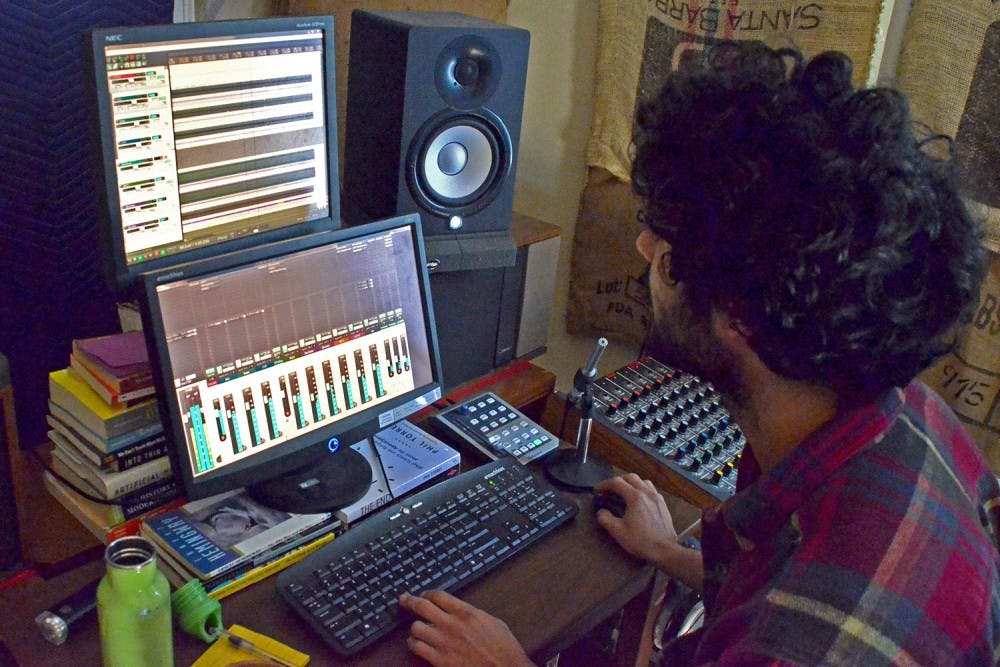“The dampening material rids you of resonance. I used really dense fiberglass that has the right frequency and put it inside the bags from Carrboro Coffee Roasters,” he said. “The dampening material is just mostly wood I cut and carved.”
Sleepy Cat’s relaxed atmosphere and DIY gear are contrasted by the Rubber Room recording studio’s modern take on the classics.
“We have a cool mixture of vintage gear from the ’50s that we still use today,” owner Jerry Brown said. “And we use it alongside our modern pro tools.”
Twenty years ago, Brown opened the Rubber Room, named for the rubber sheets used for sound absorption. Since then, the independent studio has recorded albums with musicians like Ben Folds Five and the Steep Canyon Rangers using the studio’s prized microphone.
“We have a Neumann U 47 which is like the Rolls Royce of microphones,” Brown said. “It’s the type Frank Sinatra used and they’re still highly sought after today.”
But there’s more to recording music than just the equipment.
Chris Wimberley, owner of independent studio Nightsound Studios in Carrboro, said the creative process is also important.
“Many times it’s about the chemistry of who you’re working with, how they use the tools and why you’re working on a project,” he said. “You can create something amazing with the right combination of those roles.”
Nightsound opened 15 years ago and has catered to student bands, local groups like Mipso and even big names like Chase Rice. But no matter who is recording, Wimberley said each project carries its own significance.
“If someone wants to make something and put it in a shoebox for their grandma, that’s fine with me,” he said. “That’s just as important as working on a top Billboard hit.”
Wimberly’s philosophy helped UNC Class of 2013 graduate Gabriel Reynolds learn more about the recording process.
“I recorded a few albums with Chris at Nightsound — one took eight days and another took eight months,” Reynolds said. “And Chris really helped us through it and taught us with this hands-on approach.”
To get the day's news and headlines in your inbox each morning, sign up for our email newsletters.
Reynolds said the technical side of sound mixing and producing can be daunting, which makes the artists’ relationship with the studio so critical.
“It’s really important to work with someone I can trust,” he said. “I like having a comrade to help me with the technology I don’t understand.”
Being a comrade in the music business might just be what Rachel Narula does best. She opened her own home studio in her namesake 26 years ago in Chapel Hill. She has mentored hundred of musicians, helping them realize the significance of their hard work.
“Everybody realizes later on what a valuable skill it is to be able to pick up an instrument and play ‘Happy Birthday,’ a romantic song for a loved one or even holiday songs,” she said. “It makes special moments even more special.”
Narula teaches piano and guitar out of her home — a setup she has been working on for years.
“I knocked down a wall in my house to make room for a larger lesson space,” Narula said. “Now I have several pianos so I can teach group lessons, and one day I hope to get a Steinway piano.”
For Khoujinian, one day means one day at a time. While he’s not sure where his music career will lead, for now he’s enjoying mixing beats between the burlap.
“Just because it’s in the home doesn’t mean that we can’t capture quality sounds.”
@ErinWyg28
arts@dailytarheel.com




